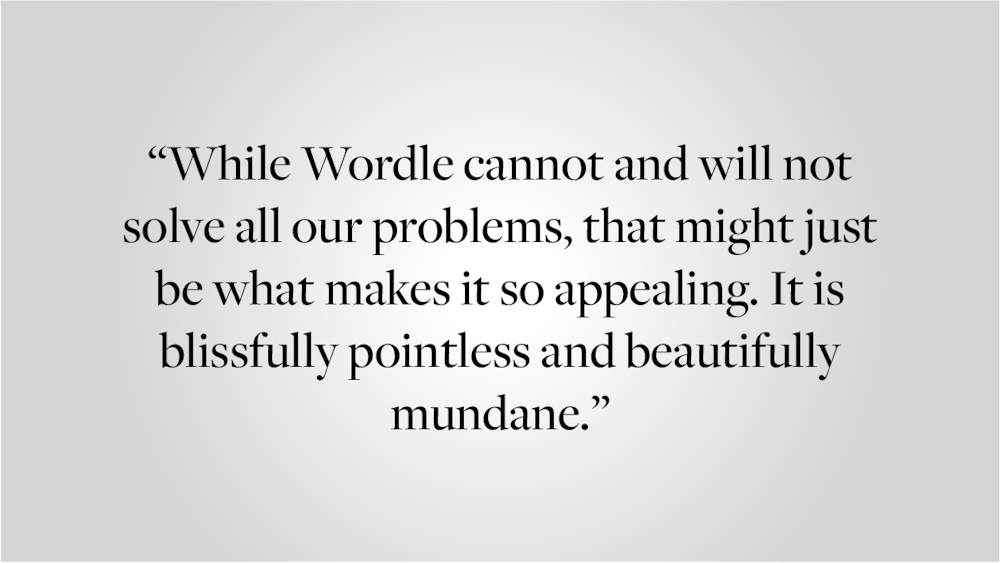With 9 a.m. classes every day this semester, my morning routine reminds me daily of just how loud everything becomes when you’re trying to get ready in silence. Normally, this involves stumbling to the communal shower and back, trying in vain to apply some mascara in the dim dorm lighting and making an incredibly mediocre cup of coffee — all while actively trying not to wake up my roommate.
Despite the chaos of this daily morning shuffle, there’s an element of my routine that I’ve genuinely come to cherish: Like millions of others, every morning I sit down before class, open a new browser and play the daily Wordle.
Similar to the classic game “Hangman,” Wordle challenges users to decode a different five letter word each day. After submitting a guess, each letter in the word turns green (the letter and location are correct), yellow (correct letter, wrong location) or gray (the letter is not in the word at all). You have six tries to guess the word correctly, using a process of elimination to narrow down the remaining letters after each round. Created by computer programmer Josh Wardle in October 2021 and sold to The New York Times in late January, Wordle has quickly become one of the internet’s favorite pastimes. With millions of daily players and a cult-like following on social media, Wordle-mania has successfully taken the internet — and our daily routines — by storm. Delightfully simple and (generally) solvable, the internet’s new favorite word game provides the perfect dose of joy amidst the mundane.
Like most successful games, puzzles and riddles, Wordle delivers that ever-satisfying “aha moment” and the accompanying burst of dopamine. However, the Wordle phenomenon runs much deeper than mere biology: With a new word to guess each day and endless people to discuss it with, Wordle strikes the perfect balance between stimulation and routine — and between competition and community. While this analysis might sound a bit theatrical, Wordle certainly isn’t. In fact, that’s probably it’s biggest draw.
So many forms of entertainment exist on the edges of two extremes. With only so many hours in the day, most of my reading ends up being for school rather than pleasure. As a result, I’m often so focused on absorbing as much information as possible that I forget to actually sit back and enjoy what I’m reading. On the other hand, I normally watch TV shows because I want to zone out. I often throw on an old episode of “Vampire Diaries” or “Parenthood” just to avoid steeping too long in my own thoughts. As it turns out, this is actually pretty common: In a 2009 study by consumer research firm Solutions Research Group looking at the media habits of American women, 58% of respondents reported turning TV on in the background.
By contrast, Wordle forces me to turn down whatever music or podcast episode I was previously using to drown out my thoughts and actually keep myself company. Confronted with a puzzle that requires my full attention to solve, Wordle is a nice change of pace. I’m not just numbly consuming content, but actively engaging with it. It lets us problem-solve without the pressure of grades and deadlines, and unwind without actively running away from ourselves. It’s stimulation without the stress, and entertainment without the anesthetic.
Wordle is also uniquely binge-proof. While I love the rush of binging an entire series on Netflix or Hulu, I often resist the urge to start a completely new show in the middle of the semester — what if I can’t help but watch the whole thing? I worry that if I get too invested, I won’t be able to make time for anything else. As a result, I often end up watching so much TV on school breaks that it ceases to be enjoyable. Because everyone is limited to one play per day with Wordle, it’s physically impossible to apply this same mentality to the game. And strangely, I don’t wish that I could. Because Wordle only takes a few minutes to solve, it’s comforting to know that I can easily find time to play again tomorrow. When we tell ourselves we can’t have something, we tend to focus on it more — something that often leads to binging when we finally let ourselves indulge. But with Wordle, we can free ourselves from this scarcity mindset, and consequently, free ourselves from the urge to binge.
Wordle famously comes with a built in sharing feature — something that has no doubt given rise to the game’s massive popularity on social media. With over 2 million tweets about the game in the last month alone, it’s not uncommon for people to share their scores, celebrate their most recent victory or complain about particularly challenging words. With so many adults now working from home, and with so many social functions either modified or canceled due to the pandemic, Wordle has become a stand-in for the bonding and conversation traditionally supplied by an office water cooler chat.
Everyone seems to have a different Wordle strategy. For instance, my dad tries to eliminate A, E, O, S and T as soon as possible. One of my friends first goes for the vowels, while another wants to nail down the Y. My sister uses a different starting word every morning, but another friend is loyal to the word “irate.” The challenge is universal but each approach is unique — and in sharing our scores, strategies and struggles, we easily transform something personal into a source of connection.
The universality of Wordle is quite refreshing — we all get the same word and the same number of chances to guess. And while it’s tempting to declare Wordle the long-prophesied “thing that brings us all together,” I’ll spare you the preachy calls for unity. While Wordle cannot and will not solve all our problems, that might just be what makes it so appealing. It is blissfully pointless and beautifully mundane.





